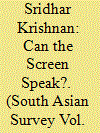|
|
|
Sort Order |
|
|
|
Items / Page
|
|
|
|
|
|
|
| Srl | Item |
| 1 |
ID:
187986


|
|
|
|
|
| Summary/Abstract |
This study analysed the short- and long-term impacts of fiscal consolidation on social sector spending in Indian economy and thereby on human capital. Using autoregressive distributed lag framework, the study found that fiscal adjustments have significant potential to undermine the short- and long-run spending in human capital. A fiscal adjustment aimed at strengthening fiscal position of the Indian economy can have adverse impacts on the growth rate of income. Lower-income growth will imply increased constraint on part of the government to spend in public utilities like education and health. Similarly, a fiscal adjustment based on slashing government spending can adversely impact both short- and long-term welfare spending as these spendings are mainly financed by deficits. The policymakers while framing the design of a consolidation programme need to take extra precaution as far as the composition of these adjustments are concerned. Moreover, there is need of legislate aimed at changing the nature of welfare spending from discretionary to compulsory.
|
|
|
|
|
|
|
|
|
|
|
|
|
|
|
|
| 2 |
ID:
187989


|
|
|
|
|
| Summary/Abstract |
What if a museum is not built out of cement and stone, but codes on a virtual space? In what ways do virtual platforms operationalise the concept of a museum? The paper explores these questions based on the empirical case study of Museum of Material Memory (MMM) and how it operates on Instagram. To this end, the objectives of this paper are twin fold. Firstly, it investigates the characteristics that make MMM a museum as distinct from a social media blog or a website. And secondly, it explores the politics of curation in relation to conventional physical museums in conjunction with issues thrown up by Instagram as a medium of display. The paper argues that MMM’s virtual mode of operation challenges the methods of heritage conservation envisaged by museums by demonstrating how tangible heritage can be museumised through virtual means. In doing so, MMM lays emphasis not only on the object per se, but also on the relationship that the object may have with its setting and the people around it. Such a model of display democratises expertise by obfuscating the difference between producers and consumers of heritage.
|
|
|
|
|
|
|
|
|
|
|
|
|
|
|
|
| 3 |
ID:
187987


|
|
|
|
|
| Summary/Abstract |
The unemployment among arts, humanities and social sciences graduates has been a significant phenomenon in many countries in the world including Sri Lanka, which has received intense attention from policymakers in recent times in which the fault is often directed at the universities that produce these graduates. According to the Labor Force Survey of Sri Lanka, overall unemployment remained at 5.1% while the youth unemployment rate remained at 23.3% in 2019, which included more than 50,000 unemployed graduates, most of whom were humanities and social sciences graduates. In this backdrop, this paper reviewed the causes of unemployment and the issues of the employability of humanities and social sciences graduates in Sri Lanka. The study revealed that the graduates in humanities and social sciences have not been employable mainly due to the fact that there has been a significant skills mismatch as graduates lack employable skills and attributes. Moreover, unemployment of humanities and social sciences graduates is caused by a number of factors including skills deficiency, occupational immobility, geographical immobility, technology change, a lack of sufficient jobs growth and various structural constraints in the economy. The study suggests that there is a need for significant structural reforms on both the supply side and the demand side to make graduates more employable and employed. While the government is required to play a leading role in these structural reforms to create more jobs for the graduates in humanities and social sciences, the higher education institutes need to undertake a major structural reform of study programmes through a vision that enables them to produce intellectually rich, and highly skilled graduates in humanities and social sciences.
|
|
|
|
|
|
|
|
|
|
|
|
|
|
|
|
| 4 |
ID:
187990


|
|
|
|
|
| Summary/Abstract |
The vulnerability of human death due to snakebite could (possibly) be countered in the most feasible way of utilising snakes themselves if properly organised. This article attempts to identify an indigenous community (snake charmer) with its inherent expertise for answering a large-scale health issue of snakebite. Existing bureaucratic directives often do barricade such human resources from their proper utilisation through stringent laws and regulations. In the case of a tropical developing country like India, snake charmers may be the capital of captivating the ladder of betterment when governments treat them as assets. Examining snakebite fatality over the globe and gradually zooming into a state level (West Bengal) prone to health hazards, the article sounds true to its venture of showcasing a policy orientation for minimising human deaths and disadvantages. In place of a barrier, ’red tape’ might be acting as a bridge of development between wildlife and humanity.
|
|
|
|
|
|
|
|
|
|
|
|
|
|
|
|
| 5 |
ID:
187985


|
|
|
|
|
| Summary/Abstract |
Every unidimensional poverty measure is mostly based on consumption expenditure. In the household consumption expenditure survey, the questionnaire needs to record detailed information about food and non-food items. The lengthy administering time hampers the survey very often. This study applies a rapid consumption methodology on two-round panel data from the Bangladesh integrated household survey conducted by the International Food Policy Research Institute. The surveyed items for each household are partitioned into the core and optional modules. Any randomly taken optional module is assigned to a household, and missing modules are then estimated by the imputation method. In estimating the poverty indicators, the multiple imputation with chained equation model shows better estimates than the ordinary least squares (OLS) and median imputation techniques. The estimated poverty headcount ratio (FGT0) is 26.72%, whereas the full consumption data show FGT0 as 27.2%. These results suggest that the rapid consumption survey methodology in a risk-prone area can be a potential approach to estimate the consumption and poverty at a lower cost and lower administrative time.
|
|
|
|
|
|
|
|
|
|
|
|
|
|
|
|
| 6 |
ID:
187988


|
|
|
|
|
| Summary/Abstract |
The reproductive healthcare system is meagre in the ethnic communities of Bangladesh. Notwithstanding the availability of studies on the healthcare-seeking behaviour of ethnic groups in Bangladesh, studies explicitly focused on the social networks of ethnic women, and their likely influences on reproductive health in this context are rare. We analyse how social networks impact ethnic women’s reproductive healthcare-seeking behaviour in Bangladesh. A total of 205 married ethnic—Garo and Mandai—women were selected purposively from Madhupur Upazila in the Tangail district. Data were collected through face-to-face interviews using a structured interview schedule. Descriptive statistics show that the average score of reproductive healthcare-seeking behaviour of Garo and Mandai women is low (40 out of 70), and the average network size of that women is slightly small (2.58). Results from hierarchical multiple regression models show that, next to years of schooling, reproductive health-related training and membership status, network size is positively related, while reproductive health constraints are negatively related, and ethnicity is not statistically associated with reproductive healthcare-seeking behaviour of Garo and Mandai women. This study reveals that social networks of ethnic women may improve their reproductive healthcare-seeking behaviour in Bangladesh. Hence, the policy recommendation is that social network agents are more equipped with reproductive health-related knowledge and information.
|
|
|
|
|
|
|
|
|
|
|
|
|
|
|
|
|
|
|
|
|